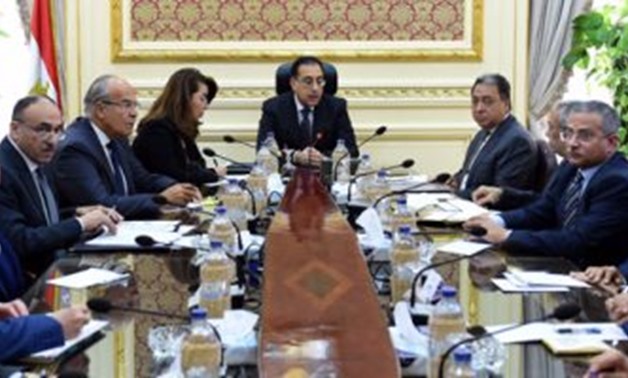
The Cabinet, headed by the acting Prime Minster Mustafa Madbouli, review on Wednesday a comprehensive report on the duties carried out by various ministries and bodies with regard to developing the services provided to residents of al Rawda village - EGYP
CAIRO – 17 June 2018: Egypt continues implementing its reform program by cutting its fuel subsidies for the fourth time since 2014, following the announcement of the decision, ministers of the new government, which was sworn in on Thursday, issued different statements related to the topic.
Egypt Today reviews the statements of the ministers related to the new fuel prices and cutting the subsidies.
Prime Minister Mostafa Madbouli announced in a video conference that the increase of transportation fares will be around 10 to 20 percent, stating that most governors have set new fares and will announce them on public stations.
Madbouli, who is also the Minister of Housing, Utilities and Urban Communities, stressed on the importance of intensifying control campaigns on the markets to ensure the commitment of gas stations’ workers and drivers of different means of transportation to the new prices.
For his part, Minister of Petroleum Tarek El-Molla said that the total cost of oil products subsidy over the past five years reached LE 517 billion, clarifying that generic subsidies have a multitude of negative consequences on the Egyptian economy.
He also explained that those who actually deserve petroleum subsidies did not benefit from the system, which has proven unpractical, over the years.
Molla added that the current subsidy system has a negative impact on social justice due to the fact that high-income segments also benefit from these subsidies, thereby decreasing the amount of money the government has to spend on the public. This is a clear difference between equality and equity, implies Molla.
The minister of petroleum also explained that increasing the prices of petroleum products saves LE 50 billion for the country, money that he suggests could be allocated elsewhere to benefit people. Instead, this money is expected to be allocated to healthcare or educational services to ensure better human, social and economic development for all, ensuring equity and social justice, instead of quality; between equality and equity. Much of the research has shown that equity leads to social and economic justice, as well as human and social development, while equality does not necessarily do so, as it limits competition and leaves people on an unequal footing.
Meanwhile, the official spokesman of the Ministry of Petroleum and Mineral Resources, Hamdy Abdel Aziz, said that despite the increase in fuel prices approved by the Cabinet today, the state still subsidizes fuel by between 20 and 25 percent of its cost.
Abdel Aziz added that the ratio of revenues of sales at the local price to the cost is still about 75 percent to 80 percent. The Ministry of Petroleum and Mineral Resources is setting an ongoing strategy to increase domestic production of oil and gas to reduce import and reduce costs, he added.
"Despite the recent increase in the prices of petroleum products, the government still supports various types of petroleum products, and the local price has not yet reached the value of the cost of production, where the domestic production accounted for about 70 percent of consumption, and the remaining 30 percent is exported," he pointed out.
Moreover, Minister of Finance Mohamed Ma'it said that the subsidy of petroleum products in the upcoming budget of the fiscal year 2017/2018 recorded LE 89.1 billion, down from LE 110.15 billion in the current year.
The minister said that the continuity of the high oil prices would raise the subsidy bill in the budget to LE 180 billion, which would affect the allocations to health and education and efforts to provide new job opportunities, stating that these are the reasons behind moving fuel prices.
He added that the upcoming budget is adopting several subsidies' programs with total costs of LE 334 billion, a move that ensures that the state continues providing care and protection for low-income brackets.
Ma'it added in a statement that global prices of oil which exceeded $80 per barrel, pushed the state to get local prices right.
The minister of finance clarified that this increase comes as step to avoid the rise of the budget deficit and to control the state’s debts.
The Cabinet announced on Saturday, which corresponds to the second day of Eid el-Fitr, the new prices of the fuel, to decrease its subsidy gradually.
Gasoline 95 prices went up from LE 6.6 ($ 0.37) per liter to LE 7.7, while 92 octane gasoline prices amounted to LE 6.75 instead of LE 5 per liter. Prices of gasoline 80's liter increased to LE 5.5 instead of LE 3.65, the newly-appointed government said in its first move since taking oath Thursday.
The price of diesel will be LE 5.5 a liter instead of LE 3.65, while the price of natural gas used for vehicles rose to LE 2.75 per cubic meter instead of LE 2.
Meanwhile, the government has announced raising the price of the cooking gas cylinder to LE 50 instead of LE 30 and the commercial gas cylinder's prices surged to LE 100 instead of LE 60.
Egypt embarked on a bold economic reform program that included the introduction of taxes, such as the value-added tax (VAT), and cutting energy subsidies, with the aim of trimming the budget deficit.
The country has floated its currency in November 2016 before it clinched a $12 billion loan from the International Monetary Fund (IMF).
The IMF loan helped the state’s foreign reserves to rebound by receiving the first three tranches of the loan with a total value of $6.08 billion.


Comments
Leave a Comment